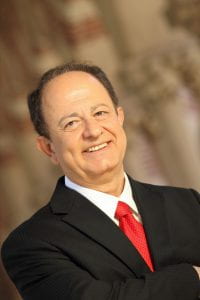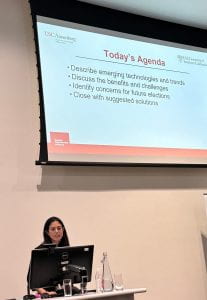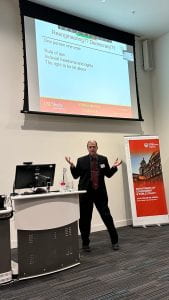
President Emeritus C. L. Max Nikias and several USC faculty highlighted the workshop Cyber-securing Democratic Elections at the University of Strathclyde in Glasgow, Scotland on June 27, 2023.
“Democracy is a fragile institution and is, by no means, perfect. It requires constant maintenance and defense,” Nikias said in the event’s main address. “Despite all of its messiness, democracy is still better than government by religious leaders, oligarchs or dictators.”
The workshop was organized by Nikias with the University of Strathclyde, and drew heavily from USC’s Election Cybersecurity Initiative. Adam Powell III, executive director of the Initiative, spoke on Lessons from USC’s Election Cybersecurity Initiative: What’s New for 2024.
USC’s Sara Mojarad, a lecturer in the USC Viterbi School who is an expert on misinformation, disinformation and social media, was on the panel Social Media, Emerging Technologies and Public Policy. Clifford Neuman, associate professor of computer science practice in the Viterbi School, spoke on the panel Converging Engineering, Social Science and Public Policy. Neuman and Mojarad have both been active with the Initiative.
Other speakers at the workshop came from the University of Strathclyde, Mississippi State University, the Marine Corps University, the University of Glasgow and the U.K. National Cyber Security Centre. The workshop was sponsored by Google.
Sir Jim McDonald, principal and vice-chancellor at Strathclyde who in 2019 became the first Scot to be elected President of the Royal Academy of Engineering, opened the daylong workshop and introduced Nikias.
“Russia presents a serious cyber threat not only to the U.S., but to its Western allies as well,’ Nikias said quoting from the 2023 Annual Threat Assessment of the U.S. Intelligence Community. “Russia launders its messages through a vast ecosystem of Russian proxy websites, individuals and organizations that appear to be independent news sources.”
Nikias went on to outline several potential cyber threats, some of which have already occurred. He pointed out that it is not unusual for storms, wildfires, accidents or power outages to disrupt elections. That would seem to indicate that an attack on infrastructure, such as the power grid, might be an easy way to disrupt an election.

“The good news is that there aren’t many adversaries who have the capability to mount such an attack,” he said. “Infrastructure attacks are something public agencies worry about the most so there are strong cyber defenses.”
He said a more likely scenario would be a distributed denial of service, or DDoS, attack. A DDoS attack occurs when someone releases a bot programmed to flood a website with fake traffic, which slows or crashes the website.
“There were DDoS attacks against websites used by election officials, campaigns and partisan groups in the U.S. states of Illinois and Mississippi during the midterm elections in 2022,” he said. “In the 2019 U.K. general election, DDoS attacks targeted both Labour and Conservative Party websites.”
More recently, criminal gangs have targeted corporations, local governments and schools with ransomware cyber attacks, Nikias said. “It’s not hard to imagine how a politically motivated ransomware attack could paralyze a campaign computer network or a government’s IT infrastructure. Even a short shut down would seriously impact a campaign’s get-out-the-vote operation or make people question the integrity of an election.”
A cyber assault with more serious consequences, and one that has already impacted a U.S. presidential race, is the hack and dump.
“We saw this in 2016 when Russian hackers known as Fancy Bear stole thousands of emails from Hillary Clinton and her campaign chair John Podesta. For months, disclosures from the emails disrupted Clinton’s campaign.” Nikias said that in 2008, China hacked the campaigns of both John McCain and Barack Obama. In 2020, Microsoft detected attacks against both Joe Biden’s and Donald Trump’s campaigns.
In 2017, Emmanuel Macron of France devised a clever defense against the hack and dump when his campaign announced that it had planted fake documents and emails on its own servers. As a result, any reporters receiving stolen files couldn’t tell what was true and what was fake.
“A great deal of fake news originates from undemocratic nations that want to see democracy fail, but some fake news is home grown,” Nikias said. “The technology to make realistic fake news is evolving rapidly.”
“It only takes a few minutes for computer software to clone a voice enabling someone to create absolutely convincing digital dialogue that was never actually uttered,” he said. “Creating false pictures and video images is getting easier all the time. More and more, we are being flooded with misinformation and disinformation that looks and sounds very real. Fake news!”

A professor of electrical engineering, Nikias also holds an appointment in classics. During his address, he spoke at length about democracy in ancient Athens. Athenian democracy featured freedom of speech and the rule of law. Participation by citizens in the democratic governing process was mandatory. But women, slaves and foreign residents, even if they’d lived in the city for generations, were not citizens. Thus, they were excluded from the Athenian version of democracy.
“The Athenians invented democracy two and a half millennia ago. But let me remind you that Athenian democracy only lasted a century and three quarters.”
He described a particularly messy aspect of Athenian democracy called ostracophoria, an election to ostracize someone. Anyone who received 6,000 or more votes in an ostracophoria was banished from Athens for a period of ten years.
“There was no appeal. The vote was final,” Nikias said. “It was simply a negative popularity contest with serious consequences.”
The Spartans so feared one charismatic Athenian leader, Themistocles, that they launched a misinformation campaign with unfounded allegations against him. Themistocles had saved Athens, and democracy, by orchestrating and winning the battle of Salamis, one of the most decisive battles of Western civilization. Nevertheless, Themistocles was ostracized and exiled from Athens. He never returned.
“Recent archeological evidence hints that Themistocles’ ostracism might have been rigged.” Nikias explained that in an ostracophoria election, citizens voted by scratching the name of the person they wanted to ostracize on a pottery shard.
“Thousands of pottery shards found recently in one archeological dig in a well on the north slope of the Acropolis, were all created by the same hand. They are exhibited today at the Museum of Ancient Agora in Athens,” he said.
“The U.S. has been modifying its constitution for well over 200 years,” he concluded. “Our history shows we must continually work to protect and improve democracy.”